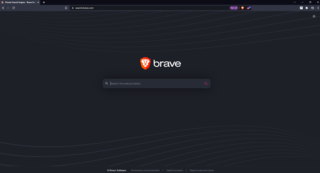
Google Search is a search engine provided and operated by Google. Handling more than 3.5 billion searches per day, it has a 92% share of the global search engine market. It is the most-visited website in the world. Additionally, it is the most searched and used search engine in the entire world.
ICQ New is a cross-platform instant messaging (IM) and VoIP client. The name ICQ derives from the English phrase "I Seek You". Originally developed by the Israeli company Mirabilis in 1996, the client was bought by AOL in 1998, and then by Mail.Ru Group in 2010.

ChatZilla is an IRC client that is part of SeaMonkey. It was previously an extension for Mozilla-based browsers such as Firefox, introduced in 2000. It is cross-platform open source software which has been noted for its consistent appearance across platforms, CSS appearance customization and scripting.
robots.txt is a standard used by websites to indicate to visiting web crawlers and other web robots which portions of the website they are allowed to visit.

In a web browser, the address bar is the element that shows the current URL. The user can type a URL into it to navigate to a chosen website. In most modern browsers, non-URLs are automatically sent to a search engine. In a file browser, it serves the same purpose of navigation, but through the file-system hierarchy.
Microsoft Advertising is an online advertising platform developed by Microsoft that provides pay per click advertising on the Bing, Yahoo!, and DuckDuckGo search engines, as well as on other websites, mobile apps, and videos. In 2021, Microsoft Advertising surpassed US$10 billion in annual revenue.

A search engine is a software system that finds web pages that match a web search. They search the World Wide Web in a systematic way for particular information specified in a textual web search query. The search results are generally presented in a line of results, often referred to as search engine results pages (SERPs). The information may be a mix of links to web pages, images, videos, infographics, articles, research papers, and other types of files. Some search engines also mine data available in databases or open directories. Unlike web directories and social bookmarking sites, which are maintained by human editors, search engines also maintain real-time information by running an algorithm on a web crawler. Any internet-based content that cannot be indexed and searched by a web search engine falls under the category of deep web.

Microsoft Bing is a web search engine owned and operated by Microsoft. The service has its origins in Microsoft's previous search engines: MSN Search, Windows Live Search and later Live Search. Bing provides a variety of search services, including web, video, image and map search products. It is developed using ASP.NET.
Search Engine Results Pages (SERP) are the pages displayed by search engines in response to a query by a user. The main component of the SERP is the listing of results that are returned by the search engine in response to a keyword query.
A search aggregator is a type of metasearch engine which gathers results from multiple search engines simultaneously, typically through RSS search results. It combines user specified search feeds to give the user the same level of control over content as a general aggregator.
Aardvark was a social search service that connected users live with friends or friends-of-friends who were able to answer their questions, also known as a knowledge market. Users submitted questions via the Aardvark website, email or instant messenger and Aardvark identified and facilitated a live chat or email conversation with one or more topic experts in the 'askers' extended social network. Aardvark was used for asking subjective questions for which human judgment or recommendation was desired. It was also used extensively for technical support questions. Users could also review question and answer history and other settings on the Aardvark website. Google acquired Aardvark for $50 million on February 11, 2010. In September 2011, Google announced it would discontinue a number of its products, including Aardvark.

DuckDuckGo (DDG) is an internet privacy company. DuckDuckGo offers a number of products oriented towards helping people protect their privacy online, most notably, a private search engine, a browser and browser extension, email protection, and app tracking protection for Android.
Web search engines are listed in tables below for comparison purposes. The first table lists the company behind the engine, volume and ad support and identifies the nature of the software being used as free software or proprietary software. The second and third table lists internet privacy aspects along with other technical parameters, such as whether the engine provides personalization.

The Google Knowledge Graph is a knowledge base from which Google serves relevant information in an infobox beside its search results. This allows the user to see the answer in a glance, as an instant answer. The data is generated automatically from a variety of sources, covering places, people, businesses, and more.

Facebook Graph Search was a semantic search engine that was introduced by Facebook in March 2013. It was designed to give answers to user natural language queries rather than a list of links. The name refers to the social graph nature of Facebook, which maps the relationships among users. The Graph Search feature combined the big data acquired from its over one billion users and external data into a search engine providing user-specific search results. In a presentation headed by Facebook CEO Mark Zuckerberg, it was announced that the Graph Search algorithm finds information from within a user's network of friends. Additional results were provided by Microsoft's Bing search engine. In July it was made available to all users using the U.S. English version of Facebook. After being made less publicly visible starting December 2014, the original Graph Search was almost entirely deprecated in June 2019.

This page provides a full timeline of web search engines, starting from the Archie search engine in 1990. It is complementary to the history of web search engines page that provides more qualitative detail on the history.

AMP is an open source HTML framework developed by the AMP Open Source Project. It was originally created by Google as a competitor to Facebook Instant Articles and Apple News. AMP is optimized for mobile web browsing and intended to help webpages load faster. AMP pages may be cached by a CDN, such as Microsoft Bing or Cloudflare's AMP caches, which allows pages to be served more quickly.
Search engine privacy is a subset of internet privacy that deals with user data being collected by search engines. Both types of privacy fall under the umbrella of information privacy. Privacy concerns regarding search engines can take many forms, such as the ability for search engines to log individual search queries, browsing history, IP addresses, and cookies of users, and conducting user profiling in general. The collection of personally identifiable information (PII) of users by search engines is referred to as "tracking".

Brave Search is a search engine developed by Brave Software, Inc., which is set as the default search engine for Brave web browser users in certain countries.











